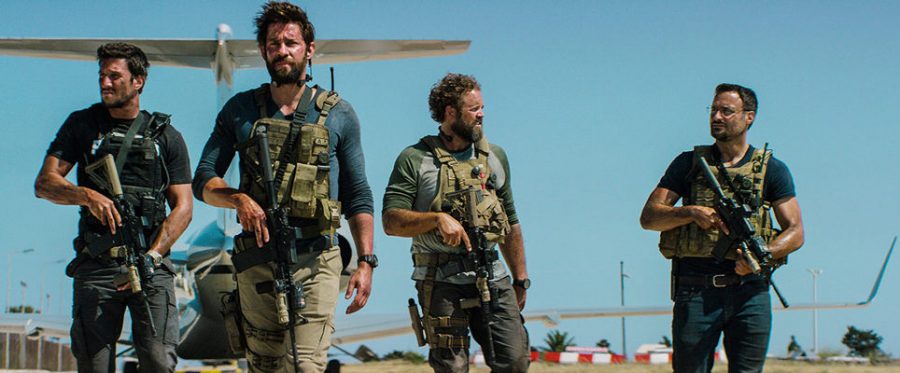Biographical war film about Benghazi offers education, understanding
The Michael Bay film “13 Hours: The Secret Soldiers of Benghazi” released Jan. 16, recounts the events of a recent chilling history, while incorporating much educational value.
The biographical war film recounts the terrorist attacks on 9/11 by Islamic militants on the American diplomatic compound and the CIA “Annex” building in Benghazi, Libya. The movie is also based off the book “13 Hours” by Mitchell Zuckoff, recounting the stories of six members of the security team who fought valiantly to defend the American diplomatic compound.
Personally, going into this film, I was not well-educated on the events of the Benghazi attacks. Five years ago, I was just a 13-year-old who was more concerned about my crops on Farmville than the political intensities around the world.
Bay does an excellent job portraying the extreme intensity of the the battle itself and the personal struggles of each of the six men fighting in this war.
He does this specifically with “The Office” star John Krasinski, who portrays war hero Jack Silva superbly.
Krasinski, playing a more serious character in comparison to other works in the past, is able to accurately show the heroism and courage of Silva.
However, at the same time, Krasinski is able to humanize the soldier in a way that viewers aren’t often exposed to, making light-hearted jokes after a massive shootout against Libyan extremists.
The five other soldiers Rone (James Badge Dale), Tanto (Pablo Schreiber), Boon (Dave Deman), Tig (Dominic Fumusa) and Oz (Max Martini), are all portrayed not only as valiant soldiers, but also as men with lives that had to be put on hold.
Another strength in this movie is one that critics and audiences may see as a weakness and that is the lessening of the political standpoint in the film.
The opening moments of the movie address a few historical facts of the attacks, but that’s about it. Many see the politics of the Benghazi attacks essential in telling the story, but I just don’t think that was what Bay was trying to get at while executing this film.
Bay really focuses on what was happening in Benghazi, keeping the audience enthralled in each singular moment at a time.
While this movie is told mostly from the point of the view of the US, I really applaud Bay for his efforts to force the audience to look at the other side as well, even if it was just for a few seconds.
In the film, we see mothers of the Libyan militants weeping over their dead sons’ bodies, with blood-soaked cloth waving in the breeze; we see the faces of Libyan children who still have to live in a country of turmoil while the soldiers get to go back home. Bringing up American politics would not have allowed these essential moments to happen in the film, and in this way, the audience becomes more empathetic.
It was clear that this film had its imperfections. Some parts were falsified to make the film more attractive for an audience, but that’s show biz.
The movie as a whole could have been finished in an hour and 20 minutes rather than almost two and half hours.
However, I left this film feeling more educated on the events of Benghazi, more empathetic to the other side and more understanding of what the soldiers went through.
I highly encourage you to take some time this week to go see this war thriller. I promise you won’t regret it.








Jeremiah Agware • Dec 6, 2021 at 8:47 am
I do spend most of my free time watching movies and TV series. It’s almost like I don’t have a life after work and movies I agree with you on this and keep up the good work.